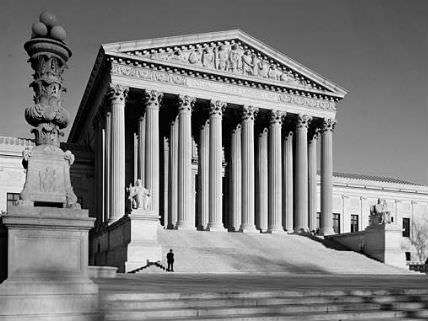This Awful SCOTUS Decision Helped Create Today's Civil Asset Forfeiture Racket
Bennis v. Michigan should be overruled.
Civil asset forfeiture is one of the most destructive and flagrantly unconstitutional government practices occurring in the United States today. Under its auspices, law enforcement agencies are permitted to seize cash, cars, homes, businesses, and other property from innocent people who have been neither charged nor convicted of any underlying crime. The seized property is then either sold, with the government pocketing all or most of the proceeds, or put to use by the agency that took it. In either instance, law enforcement gets to profit from its policing. All of this occurs despite the fact that the Constitution clearly forbids both the federal government and the states from depriving any person of life, liberty, or property, without due process of law.

How did we get here? The U.S. Supreme Court deserves its share of the blame.
In 1996 the Supreme Court issued its far-reaching decision in the case of Bennis v. Michigan. At issue was the seizure of a Pontiac automobile driven by a man named John Bennis, who was arrested in the car with a prostitute and later convicted of gross indecency. John's wife, Tina, was joint owner of that car and, for understandable reasons, objected when the state took it away from her for a crime that she did not commit. So she went to court to stop the forfeiture proceedings, arguing, correctly, that she was perfectly innocent yet the state had deprived her of her interest in the car without even pretending to offer any sort of due process.
Unfortunately, she lost the case. Writing for the majority, Chief Justice William Rehnquist rubber-stamped the entire civil asset forfeiture racket. "An owner's interest in property may be forfeited by reason of the use to which the property is put even though the owner did not know that it was to be put to such use," he wrote. So much for the Due Process Clause.
Predictably, civil asset forfeiture abuse has only increased in the two decades since that permissive ruling was issued.
Here's one representative example. In 2013, a man named James Leonard was stopped by Texas police for speeding on U.S. Highway 59. The cops obtained a search warrant for his car and found a safe in the trunk containing $201,100 in cash and a bill of sale for a house in Pennsylvania. Leonard insisted that the safe belonged to his mother, Lisa Olivia Leonard, and contained her proceeds from a house that she had sold. Lisa Olivia Leonard told the authorities the same thing.
But the police had other ideas. According to the affidavit filed by Officer John Shaver, "in my experience, carrying large amounts of U.S. currently is commonly associated with the illegal narcotics trade. In my experience, Highway 59 is a main thoroughfare for the transport of U.S. currency and narcotics in the illegal drug trade." In other words, the cops declared the $201,100 to be drug money and seized it as "contraband" under the state's sweeping civil asset forfeiture laws. No drug charges were filed in this matter.
Much like Tina Bennis before her, Lisa Olivia Leonard promptly went to court seeking the return of her property. But she lost too. Earlier this year, the Supreme Court declined to take up her case.
There was one small bit of silver lining in Leonard v. Texas, however, and it came in the form of a statement respecting the denial of certiorari filed by Justice Clarence Thomas. In it, Thomas agreed, for procedural reasons, that the Court should not hear this particular case at this particular time. But Thomas also made it clear that when the right case did come along, he would gladly deliver the judicial benchslap that civil asset forfeiture so rightly deserves.
Here's hoping the right case arrives at SCOTUS sooner rather than later. Bennis v. Michigan is an awful decision that has helped to fuel countless injustices committed by police, prosecutors, and other law enforcement officials. Its days as a Supreme Court precedent deserve to be numbered.


Show Comments (45)